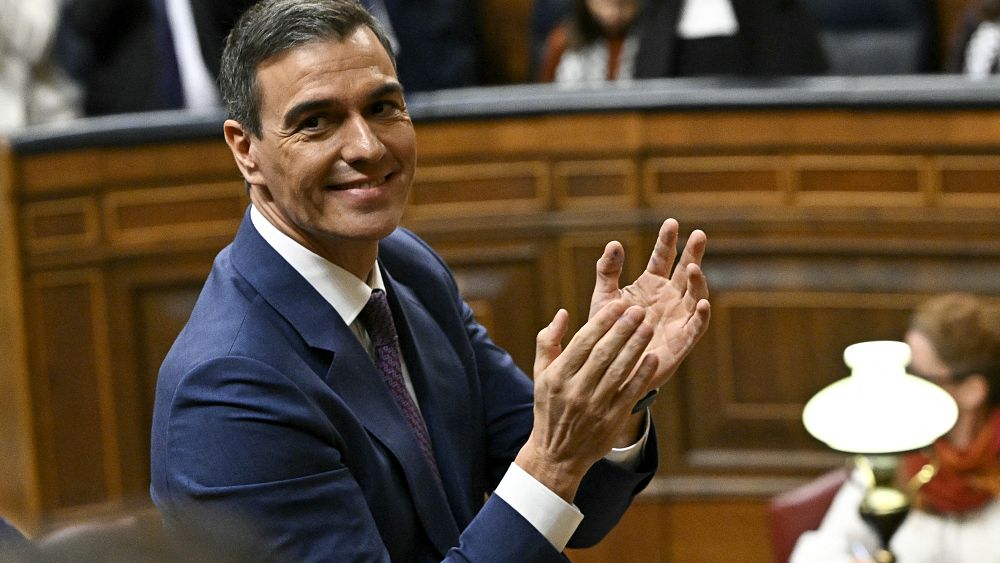Long applauded in Parliament, Pedro Sanchez was reappointed as head of Spain, even if the Spaniards remain deeply divided over the amnesty law.
Parliament has reappointed Pedro Sanchez as head of Spain, a country deeply divided over the Prime Minister’s decision to grant an amnesty law to Catalan separatists, in exchange for their support.
In power since 2018, the socialist obtained the votes of 179 deputies after two days of tense debates, a number greater than the absolute majority set at 176.
This vote of confidence puts an end to nearly four months of political blockage and will allow Pedro Sanchez to form a new government with his allies in the far-left Sumar coalition.
Coming second in the July election, behind his conservative rival Alberto Nuñez Feijoo, the Prime Minister has had to negotiate in all directions in recent weeks the support for his renewal from several regionalist groups, whose votes are crucial in a very fragmented Parliament.
In particular, he had to convince the party of Catalan separatist Carles Puigdemont, leader of the attempted secession of Catalonia in 2017, who fled to Belgium six years ago to escape legal proceedings launched against him.
Agreeing, after intense negotiations, to support Pedro Sanchez, Carles Puigdemont obtained, in exchange for the votes of the seven deputies of his party, the upcoming adoption of an amnesty law for hundreds of separatists pursued by the courts. .
A measure that will allow him to return to Spain.
“Close the wounds”
Exposing to deputies the priorities of his new mandate, clearly marked on the left with numerous social promises, Pedro Sanchez defended on Wednesday the necessity and constitutionality of this amnesty, to which he was nevertheless opposed in the past.
This measure will make it possible to “heal the wounds” opened by the 2017 crisis, declared the Prime Minister, assuring that he wanted to guarantee “the unity of Spain through dialogue and forgiveness”.
The Popular Party (PP) of Alberto Nuñez Feijoo accuses the socialist of having conceded with the sole aim of remaining in power and raises the risk that Spain will find itself in the sights of the EU, like Hungary or Poland, due to the attack on the rule of law that this measure constitutes, according to him.
Rejected, according to several polls, by a majority of Spaniards, this amnesty brought hundreds of thousands of people into the streets on Sunday, at the call of the PP. A new mobilization is planned for Saturday in Madrid.
New scuffles
The daily rallies, in front of the headquarters of the Socialist Party in Madrid, of the extreme right have also regularly degenerated since last week.
On Wednesday evening, 15 people were again arrested for disturbing public order after further clashes with the police, according to the prefecture.
Due to these tensions, more than 1,600 police officers were again deployed on Thursday around Parliament, which had been completely cordoned off since Wednesday by the police. A system equivalent to that of a football match classified as high risk.
In this context, Pedro Sanchez called on the opposition not to “take advantage of this situation to set fire to the streets.”
A sign that the heterogeneous majority supporting the socialist promises to be unstable, Mertxe Aizpurua, the representative of Bildu, warned that the favorable vote of her party, considered as the heir to the political showcase of the Basque separatist organization ETA, will not was not “a blank check”.
“Unfortunately, the government will have to be renewed month after month”, depending on the interests of the different parties supporting it, denounced Mr. Feijoo, according to whom Pedro Sanchez will not in fact really be “in control” of the executive.
**”Although he came in second place in the elections, Pedro Sanchez once again demonstrates his ability to rise from the ashes and forge major alliances to once again become president of the government. Sanchez is an expert in political balance. This will be his second minority government, but its pacts with the Catalan separatists and the contestation in the streets of the future amnesty law suggest an extremely complicated legislature.
**
The Sanchez government was born with a sword of Damocles hanging over its head. Catalan separatists have already warned that they will abandon him if he does not keep his promise to bring Carles Puigdemont and other Catalan activists back to Spain. It won’t be easy, but Pedro Sanchez has proven over the years that he knows how to get back on his feet.”explains our correspondent in Madrid Jaime Velazquez.



